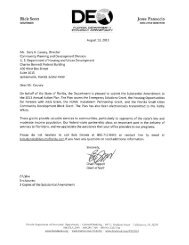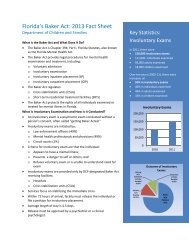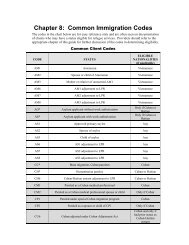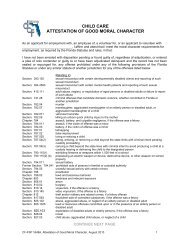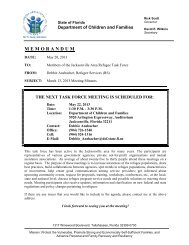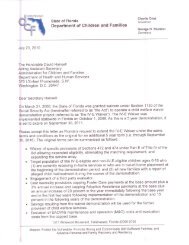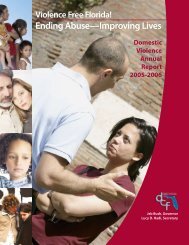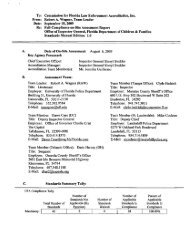The National Strategy for Child Exploitation Prevention and Interdiction
The National Strategy for Child Exploitation Prevention and Interdiction
The National Strategy for Child Exploitation Prevention and Interdiction
Create successful ePaper yourself
Turn your PDF publications into a flip-book with our unique Google optimized e-Paper software.
<strong>The</strong> Effect of the Lack of Internet Regulation on Law En<strong>for</strong>cement InvestigationsAmong NDIC interviewees:• 95 percent of respondents reported that the lack of Internet regulation has restricted lawen<strong>for</strong>cement investigations <strong>and</strong> assisted offenders in committing child pornographyoffenses.• 70 percent of respondents reported that the lack of Internet Service Provider (ISP)regulations, including but not limited to, reporting child pornography, responding to lawen<strong>for</strong>cement inquiries, <strong>and</strong> retaining customer IP addresses, IP logs, <strong>and</strong> other subscriberin<strong>for</strong>mation, have hampered law en<strong>for</strong>cement investigations.Some agencies cite the Wiretap Statute, which strictly prohibits the interception of internationalelectronic communications, including online communications regarding child pornography,without a specific court order. This is in contrast to U.S. Customs laws, which, in an ef<strong>for</strong>t tosafeguard the United States from the unlawful importation or smuggling of contrab<strong>and</strong>, imposesfewer restrictions on searches of packages entering the country. Consistent with those laws,airports, border crossings, <strong>and</strong> ports of entry have established rules <strong>and</strong> regulations <strong>for</strong> theconduct of inspections by Customs <strong>and</strong> Border Protection (CBP) <strong>and</strong> ICE. However, because ofthe restrictions imposed by the Wiretap Statute, there is no comparable authority available to theagencies charged with intercepting the international electronic communications of suspectedchild pornography offenders. Some agencies suggest exempting, in a manner consistent withapplicable constitutional limits, the international electronic communications of such offendersfrom at least some of the restrictions imposed by the Wiretap Statute.Transnational Organized Crime Element of <strong>Child</strong> PornographyAmong NDIC interviewees:• 85 percent of respondents reported that there are international <strong>and</strong> transnational groupsthat operate pay sites of child pornography. <strong>The</strong>se sites are lucrative <strong>and</strong> operate strictly<strong>for</strong> profit.• 68 percent of respondents reported that web sites, ISPs, <strong>and</strong> governments in othercountries are not cooperative in child pornography investigations <strong>and</strong> often ignore theproblem of child pornography. <strong>The</strong>y also responded that serving subpoenas in othercountries is often difficult if not impossible.Many agencies reported Russia as having the most significant transnational organized crime rolein child pornography.Psychological Impact to a <strong>Child</strong> Pornography VictimAmong NDIC interviewees:• 95 percent of respondents reported that a child suffers lifelong psychological damage <strong>and</strong>may never overcome his or her trauma from being a child pornography victim.• 75 percent of respondents reported that children suffer from knowing that their imagesexist in perpetuity <strong>and</strong> that even if their abuser is convicted, there are still other childpornography offenders out there viewing their images, offenders that the victims may runinto in social settings.D-12



